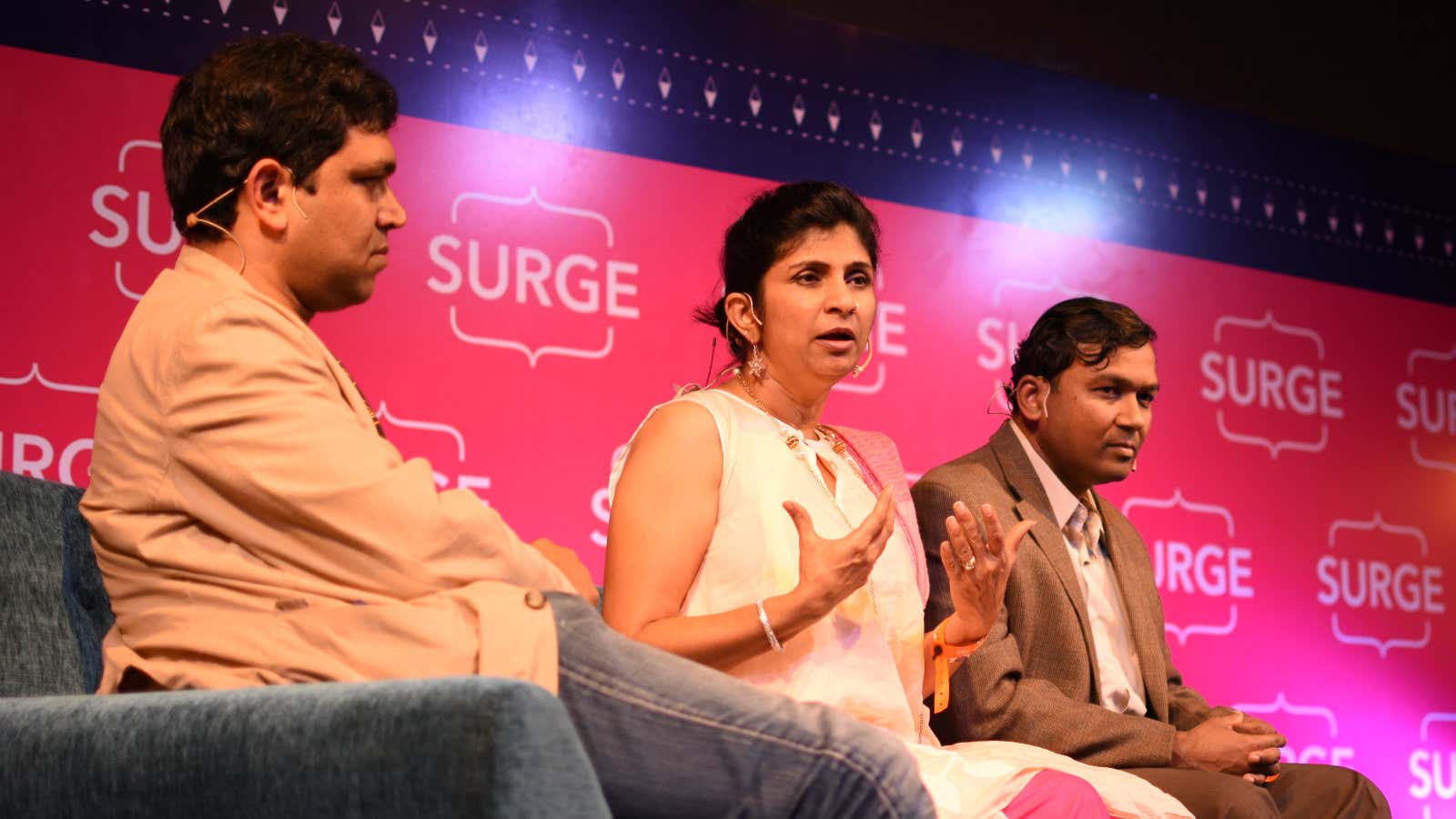After an unprecedented funding boom in the Indian startup ecosystem for a couple of years, the enthusiasm has somewhat worn off. Lately, the general perception has been that venture capital (VC) funding is shrinking.
On Feb. 23, however, the brass of three of the country’s leading VC firms had an entirely different story to tell. Kalaari Capital managing director Vani Kola, Accel India partner Shekhar Kirani and Blume Venture Advisors managing partner Karthik B Reddy believe that there is enough money to be invested in the Indian startup community. But they’re focused on finding the smartest ideas and sharpest entrepreneurs.
Here are edited excerpts from their conversation at SURGE 2016, a technology conference currently underway in Bengaluru:
Large startups have set a high benchmark in India, where does that leave younger entrepreneurs?
Kalaari’s Kola: I think we and the media focus relentlessly on how much money has been raised and at what valuation. That’s absolutely irrelevant. The benchmark for each company ought to be in what they are working on, what impact and value did they drive, how many lives did they change, and how much time did they help people save.
Accel’s Kirani: There is always money available for startups of all sizes—but you need to have the right kind of business. If the business economics of a startup are good, and the team knows exactly what they’re doing, there is definitely money for them.
Yes, there are large investments that have happened in India—in the unicorns—but we understand that there are many other startups that are building up. Those who promise something and deliver on that promise will create value. We continue to be bullish on India, but it’s a question of whether a startup is in the right area, right place and if it has a winning combination.
In 2015, we saw relationships between some entrepreneurs and investors go wrong.
Kalaari’s Kola: Right now, every entrepreneur in India thinks that getting VC funding somehow is the right step. But it may not be the right step. A VC-model works in a certain way. VCs expect extraordinary returns and everything else is centred around that. That’s really where the friction happens.
When a company is growing great, everybody is happy. But when it stops growing as much, then everyone is in the kitchen to figure out what went wrong. And if the entrepreneur and the investor don’t have the maturity to handle such critical conversations, it can get hard.
I want to tell entrepreneurs to be judicious with the money they raise and when they raise it. When you’re raising money, you must know that it comes with a certain expectation. You can’t be signing up for a Formula One car and wanting to drive slow.
When you have an angel-managed board, it’s very nurturing and engaged, but when you bring hedge funds on board, they work differently. The maturity they expect from a company is different and often times companies are not prepared for that. If you have raised millions of dollars, but you still can’t get a board deck out on time or can’t close your books—and this happens really—it’s not done.
Blume Venture’s Reddy: When you are dealing with multiple investors, each of them has a different set of expectations. For angel investor, typically getting four to five times of their money as returns is fine. But that may be grossly insufficient for a VC. At every round the stakeholders change, the expectations change, and then sometimes the founder is not clever enough to separate those expectations.
Is 2016 going to be a year for rationalisation in investments or big bang deals?
Accel’s Kirani: The leaders and winners in the market will continue to raise funds. Also, early-stage seed investment will continue for younger startups. Any efficient model, which is not capital heavy, and is asset light and disruptive is going to work for us in 2016.
Kalaari’s Kola: The number of investments we have made traditionally will continue. We will not be slowing down. But today we are looking for founders who have deep clarity on their unit economics.
Blume Venture’s Reddy: All that VCs have is their reputation. Entrepreneurs today are very smart and they reference check us—not just the firm, even individual investors. I am an early-stage investor and I am supposed to spot trends and bet on that. So we are looking at new business models and we are moving away from the 40-50 million urban users to the next 250-300 million semi-urban users. Their needs are very different so I think media and entertainment, education, financials—those are going to be the big drivers of the market for us.
